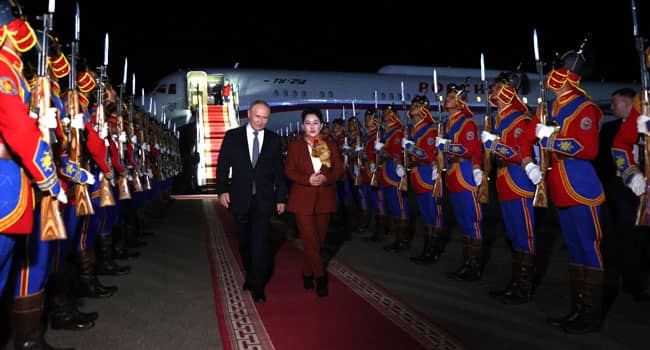ICC dismisses Mongolia’s appeal over failure to arrest Putin
The International Criminal Court (ICC) has rejected Mongolia’s request to appeal a ruling that found Ulaanbaatar in breach of its obligations for failing to arrest Russian President Vladimir Putin during his visit in September 2024.
The decision highlights the challenges faced by the ICC in enforcing its mandates, especially against powerful global leaders.
In March 2023, the ICC issued an arrest warrant against Putin for his alleged involvement in the unlawful deportation of Ukrainian children following Russia’s invasion of Ukraine in 2022.
The court accused Mongolia, a signatory to the Rome Statute, of violating its treaty obligations by not apprehending Putin when he visited.
Pre-trial judges dismissed Mongolia’s appeal request, stating that the original decision was not a formal ruling on the merits of the case but a compliance assessment regarding Mongolia’s duty to cooperate.
READ ALSO: No going back on Nigeria’s economic reform, Tinubu tells Macron
Mongolia’s additional plea to disqualify two judges and freeze the appeals decision was also denied.
“The Chamber rejects Mongolia’s request for leave to appeal,” the ICC ruling read, emphasising that the referral of the matter to the Assembly of States Parties (ASP) for further action remains intact.
Russia has dismissed the ICC warrant as inconsequential. Moscow insists that its actions, including relocating children from Ukrainian territories under its control, were aimed at protecting them from the conflict. However, Kyiv alleges that thousands of Ukrainian children were forcibly deported from state institutions, framing the act as a war crime.
Despite downplaying the ICC’s authority, Putin’s visit to Mongolia marked his first trip to a member state of the ICC since the warrant was issued. Previously, in 2023, Putin opted out of attending a BRICS summit in South Africa, another ICC member, due to concerns over potential arrest pressure on Pretoria.
The ICC’s decision to refer Mongolia’s non-compliance to the ASP underscores the broader challenges the court faces in holding state parties accountable.
The development also casts a spotlight on the Rome Statute’s enforcement mechanisms, especially when geopolitical considerations intersect with legal obligations.
Follow the Neptune Prime channel on WhatsApp: https://whatsapp.com/channel/0029Va74ZvU2v1IqKByXoX3d
Do you have breaking news, interview request, opinion, suggestion, or want your event covered? Email us at neptuneprime2233@gmail.com


